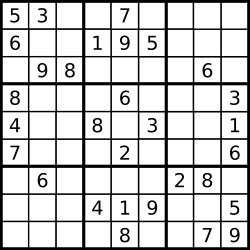Write a program to solve a Sudoku puzzle by filling the empty cells.
Empty cells are indicated by the character
'.'.
You may assume that there will be only one unique solution.

A sudoku puzzle...

...and its solution numbers marked in red.
First, if you are interested in the rule, see here.So, a method to check if the added number is valid is necessary. A hashset is used. Basically, check the entire row, the column and the sub-box where the number is at and see if the same number has already added, if it has, return false. Note the indices of the first element in the sub-box is calculated by row / 3 * 3 and col / 3 * 3. For example, row = 4, col = 5, we get the indices x = 3 and y = 3.
The main method is a boolean method. The game is solved by recursion. That is, when we add a valid number, we recursively check the next number we can add to the board until we find a solution. If a number added is not valid, we remove the number and add the next one.
That is, yeah, of course you love it, the backtracking!
public class Solution {
public void solveSudoku(char[][] board) {
if (!canBeSolved(board))
System.out.println("Cannot be solved!");
}
private boolean canBeSolved (char[][] board) {
for (int i = 0; i < 9; i++) {
for (int j = 0; j < 9; j++) {
if (board[i][j] != '.')
continue;
for (int k = 1; k <= 9; k++) {
board[i][j] = (char) (k + '0');
if (isValid(board, i, j) && canBeSolved(board))
return true;
//return to '.' for next recursion
board[i][j] = '.';
}
return false;
}
}
//go through the whole board
return true;
}
private boolean isValid(char[][] board, int row, int col) {
HashSet hs = new HashSet ();
//the column
for (int j = 0; j < board[0].length; j++) {
if(hs.contains(board[row][j]))
return false;
//only add numbers
if (board[row][j] != '.')
hs.add(board[row][j]);
}
//the row
hs.clear();
for (int i = 0; i < board.length; i++) {
if (hs.contains(board[i][col]))
return false;
if (board[i][col] != '.')
hs.add(board[i][col]);
}
//the sub-box
hs.clear();
for (int i = 0; i < 3; i++) {
for (int j = 0; j < 3; j++) {
int x = row / 3 * 3 + i;
int y = col / 3 * 3 + j;
if (hs.contains(board[x][y]))
return false;
if (board[x][y] != '.')
hs.add(board[x][y]);
}
}
return true;
}
}
No comments:
Post a Comment